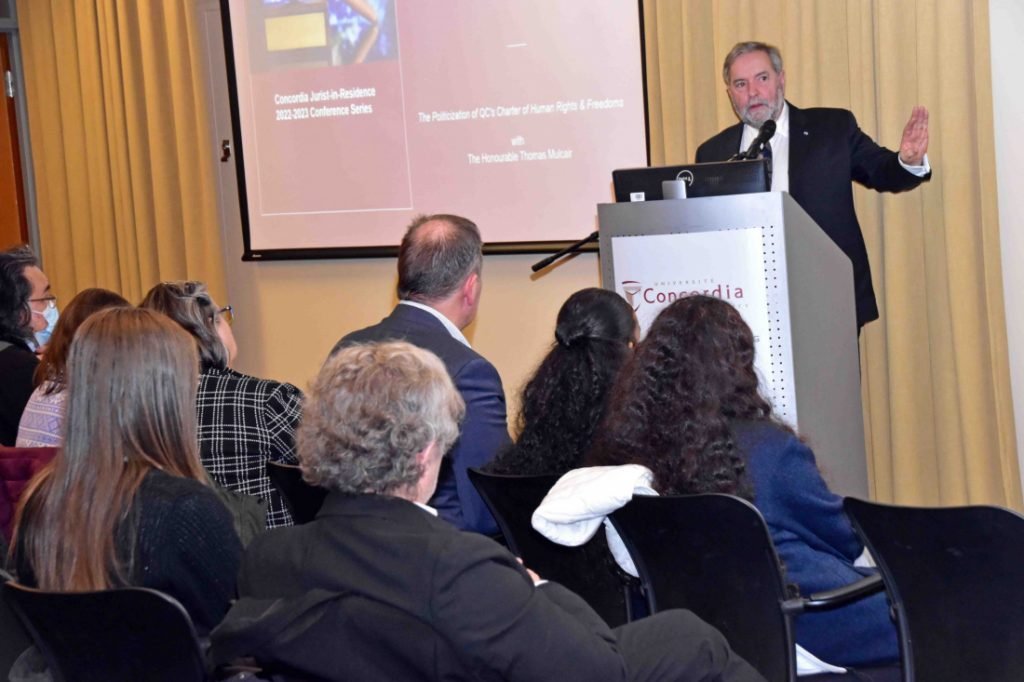Ex-NDP leader takes issue with Ottawa’s pending overhaul of Official Languages Act
In a talk at Concordia University last week, former NDP leader Tom Mulcair said that in an election he expects later this year, Quebec’s Anglophone community should “express clearly what its views are” on the Trudeau government’s Bill C-13, as well as on “the abject failure” by Prime Minister Justin Trudeau and federal Justice Minister David Lametti “to do anything to defend” the constitutional rights of anglo Quebecers.

‘Let them know,’ he says
“I would never ever – because I’m not in that game anymore, I’m not in politics – suggest to anybody how they should vote,” the former Chomedey Liberal MNA turned political analyst said during his talk sponsored by the Concordia Arts and Science faculty’s Jurist-in-Residence program at the downtown campus.
“But I can tell you that if you want a result, let people who want your vote know that you’re dissatisfied with what they’ve done so far,” said Mulcair.
C-13 not yet adopted
Introduced in March 2022, Bill C-13 is currently before the House of Commons Standing Committee on Official Languages. According to the Quebec Community Groups Network (QCGN), which has been closely monitoring the legislation’s progress, the committee is unlikely to send its report on C-13 to the House before mid-March.
As well, if Bill C-13 is adopted after third reading in the House, it will be sent for additional consideration by the Senate, further delaying it. As such, Bill C-13 is not expected to pass into law until late spring at the earliest.
‘Throttling back access’
Calling the Quebec government’s Bill 96 a “massive, complex piece of legislation that breaks down the existing rules and agreements that have been in place” since the introduction of Bill 101 in 1977, Mulcair said “despite the protestations to the contrary from the Quebec government, it is simply true that it [Bill 96] is throttling back access to English language health and social services.

“When you look at these big questions – and these are monumental questions that we’re talking about here, these are big struggles over time – you have to keep asking yourself who decides and how do you enforce,” he continued.
Rights are rights
“Because, you see, so much in the world of rights is about declaring them, but then nothing happens. Or simply saying we’ve declared all these rights, but now we’d like you to interpret it in such a way that even though we’re breaking them, that’s not actually happening. That’s the Wizard of Oz approach: ‘Pay no attention to the man behind that screen.’”
Mulcair, who worked on amending Bill 101 during the early 1980s when he was director of legal affairs at Alliance Quebec, said a detailed reading of Bill 96 reveals, among other things, a provision which says that if an English-language birth certificate from a province such as British Columbia is being used in Quebec, then it must be translated professionally into French to be validated.
What about Lametti?
“That’s not right,” he said. “Our courts are supposed to function in both languages. And yet our Attorney General, David Lametti, whose riding is Verdun here in Montreal and was a prof at McGill, is just staying with his arms folded over this thing.”
Mulcair said the federal government “is completely absent from this, as the Quebec government says that it can unilaterally amend the BNA Act to remove existing language rights.”
He said, “What Legault is doing does not respect the constitution. Trudeau knows it, his Justice Minister Lametti knows it, but they won’t do anything about it … Where is the Attorney General of Canada with regard to this power grab to remove the rights guaranteed by Section 133 of the BNA Act?…”
‘What Legault is doing does not respect the constitution. Trudeau knows it, his Justice Minister Lametti knows it, but they won’t do anything about it’
The perils of Bill C-13
Mulcair said the Trudeau government’s pending Bill C-13 [An Act to amend the Official Languages Act] would “imperil the ability of the English-speaking community to continue to say we have a constitutional guarantee of control and management of our school boards …”

However, he acknowledged that some Montreal-area Liberal MPs, including Anthony Housefather (Mount Royal) and Marc Garneau (Notre-Dame-de-Grâce–Westmount), “have fought very hard against certain aspects of Bill C-13 and there are a couple of other representatives of the federal Liberals from greater Montreal who are pushing back very hard against C-13.”
Don’t remove Notwithstanding
Despite his criticism of the Canadian Charter’s Notwithstanding clause, Mulcair said, “It’s not true that the Notwithstanding clause in and of itself should be removed completely. Because that conversation, that debate between who gets to decide will always be taking place.
“But the more fundamental the right – and that’s built into the constitution of ’82 – the more fundamental the right, the more difficult it is to change them or take them away. The parts to do with schooling, they’re beyond the scope of the Notwithstanding clause.”



